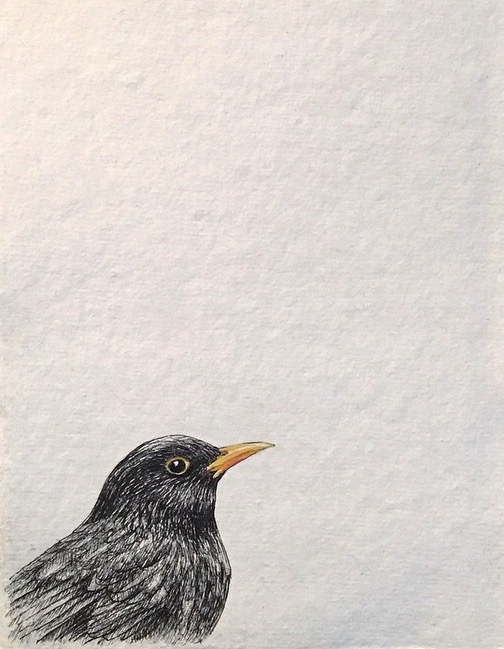Blackbird
I barely had time to register the dart and flare as he swooped, a shallow parabola of petrol-black that began from deep within a holly bush, it’s vertex barely clearing the tarmac as the blackbird began the climb in an effort to complete the perfect arc and make it to the hedge on the other side.
In my mind I have to slow it down, frame by frame, to try and understand just how close he was to not making it. One second visible, then to my horror his sooty shadow disappeared below the level of my eye line to surely collide with the bonnet of my car. But miraculously there he was, like a paper dart, puncturing deep into the rambling hedgerow of honeysuckle.
Of course this is not always the case. Blackbirds are renowned for low sweeping aerobatics and so it’s of no surprise to see their earthbound, broken and dusty bodies along the side of a lane when I’m out cycling.
But to find one, literally seconds after it’s been hit, well that’s rare.
But I did.
And right now I’m in fear of drowning as I struggle to cope with the flood of emotions that’s slipped in between my ribs as incisively as a surgeon’s blade, to jab at my heart. So quick, so skilled. Surely I shouldn’t feel a thing. But I’m ashamed to confess that I do. Ashamed, because this is not supposed to be about me, but about the blackbird that I found upside down in a drain.
We saw him only because he happened to lift a wing. Like a small black sail being raised, had it not flapped then he would’ve remained invisible to us as we drove on by in the early evening, heading for home and supper.
We pulled up into a gate way, and I ran back to see if he was alive, or whether it was simply a sick joke the wind had played as it chased the last of the daylight through the overgrown verges and the sprawl of summer-swollen hedgerows.
I gently lifted him from the gutter. His body was warm. Lying him on his left side I could see his sun-rimmed eye was clear, but deeply alarmed. He was still breathing. I felt a momentary lurch of hope. I could nurse him. As a youngster, my father had taught me to place any found and damaged wild thing somewhere warm, dark and safe to allow any shock to subside. It’s not the wound or broken bone that is the first to kill, it’s more often the shock that will take them.
But gently turning him in my hands so I could assess his back and left side, I could see that it would’ve been a useless endeavour. His left wing was broken from the shoulder and it was torn and bleeding; the back of his head was punctured and also pouring blood. No amount of careful attention would’ve mended him. I had a choice to make. And absolutely hated myself for what I was about to do.
Some will use the word ‘dispatch’ suggesting the task of killing is done with speed and great efficiency. Others try and soften the act with the term ‘put it out of its misery’, suggesting that you’re helping someone or something avoid a certain future of pain and suffering by helping them meet their maker earlier than they would have otherwise.
Had I the right to call time on this spoiled life? Should I have taken him back to the car, only to distress him further and then die in my hands. Perhaps I should have just popped him in the hedge, broken and bleeding, to take his last few breaths in familiar surroundings? My sense was that he wouldn’t have lasted the journey home, but that leaving him in a hedge it’s likely he could’ve lasted perhaps a day. Which would’ve been fine if he hadn’t been fatally wounded.
So I did what my dear father would’ve done, and has had to on many occasions over the 50 or so years that I’ve known him. My father, the birdman of Trelill who will go to the ends of the world to mend what is possible to mend. I ended the blackbird’s life as quickly as I know how.
The decision I made will horrify some, I know, when they read this. They will see me as playing God, a murderess of small things. While others will shrug and move on… it’s hardly newsworthy is it. It’s just a bird. It was going to die anyway, right? After all, let’s get a sense of proportion: There is human suffering, mass murders, and environmental events that are truly horrendous and on such a scale that it’s hard to fathom how those affected are able to carry on.
But it’s not just a blackbird is it. The car that hit it, before we came around the corner, was driven by someone in a hurry. It’s said that birds can judge speeds up to 40 miles an hour, and as such have a good chance of avoiding a collision. Any faster than that though, and they’re unable to compute. And that’s when accidents happen.
And the truth is I don’t think humans are much different.
Our lives have become faster paced, hurried, and we’re giving ourselves less time to process and assess what’s really going on. And there’s an awful lot going on that we’ve already missed. And some of us are quite surprised by this. Others still are in complete denial. Our world is shifting and evolving at such a pace that if we don’t put the brakes on we’re going to fuck it up so entirely that the odd squashed blackbird really will be the last of our problems.
But it’s a good place to start.

